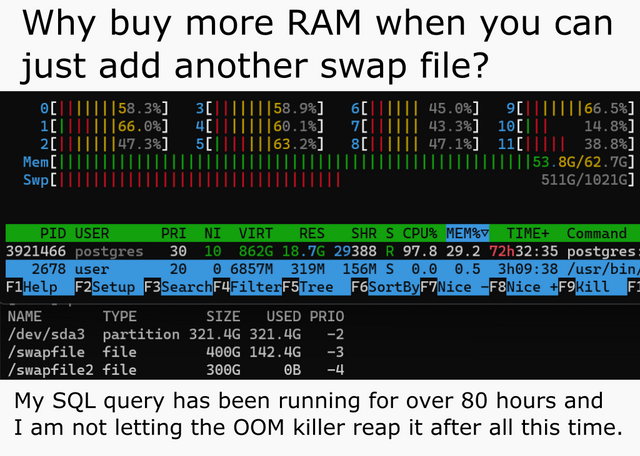this post was submitted on 02 Oct 2023
1011 points (99.1% liked)
Programmer Humor
32495 readers
285 users here now
Post funny things about programming here! (Or just rant about your favourite programming language.)
Rules:
- Posts must be relevant to programming, programmers, or computer science.
- No NSFW content.
- Jokes must be in good taste. No hate speech, bigotry, etc.
founded 5 years ago
MODERATORS
you are viewing a single comment's thread
view the rest of the comments
view the rest of the comments

Absolutely can and will take action. Doesn't always kill the right process (sometimes it kills big database engines for the crime of existing), but usually gives me enough headroom to SSH back in and fix it myself.
I have limited experience with Linux, but why is it that when my system locks up, SSH still tends to work and let me fix things remotely? Like, if the system isn't locked up, let me fix it right here and now and give me back control, if it is locked up, how is SSH working to help me?
So that's the nifty thing about Unix is that stuff like this works- when you say "locked up", I'm assuming you refer to logging in to a graphical environment, like Gnome, KDE, XFCE, etc. To an extent, this can even apply to some heavy server processes: just replace most of the references to graphical with application access.
Even lightweight graphical environments can take a decent amount of muscle to run, or else they lag. Plus even at a low level, they have to constantly redraw the cursor as you move it around the screen.
SSH and plain terminals (Ctrl-Alt-F#, what number is which varies by distro) take almost no resources to run: SSH/Getty (which are already running), a quick process call to the password system, then a shell like bash or zsh. A singular GUI application may take more standing RAM at idle than this entire stack. Also, if you're out of disk space, the graphical stack may not be able to alive
So when you're limited on resources, be it either by low spec system or a resource exhaustion issue, it takes almost no overhead to have an extra shell running. So it can squeeze into a tiny corner of what's leftover on your resource-starved computer.
Additionally, from a user experience perspective, if you press a key and it takes a beat to show up, it doesn't feel as bad as if it had taken the same beat for your cursor redraw to occur (which also burns extra CPU cycles you may not be able to spare)
Thanks, great answer!